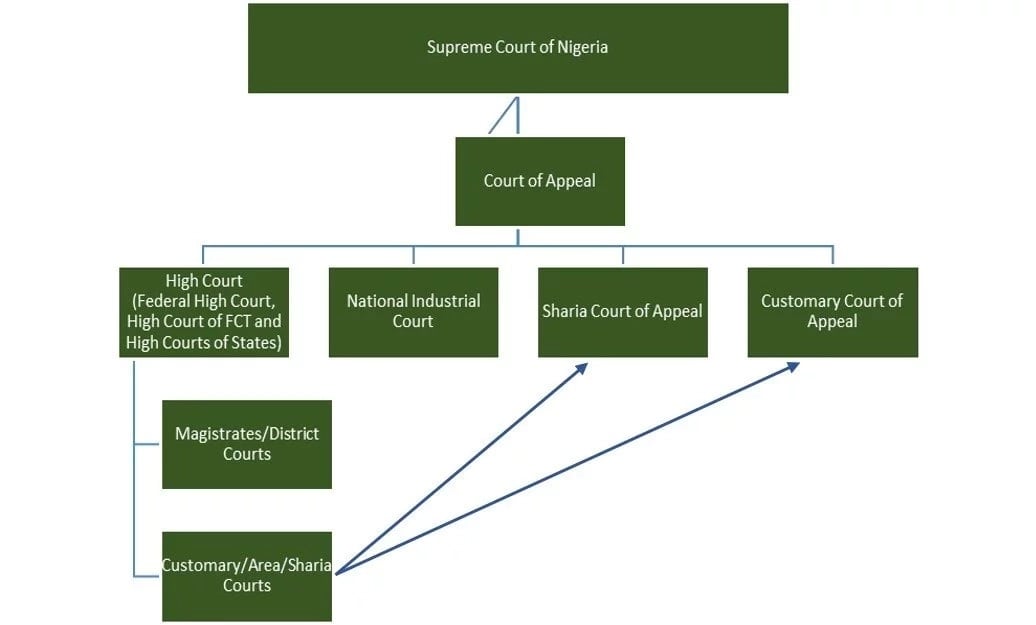- Posted on
- • Legal Advice
Overview of the Nigerian Constitution: Chapter VII—The Judicature.
- Author
-
-

- User
- Homachi Chidi-Lloyd
- Posts by this author
- Author
- Posts by this author
-

In a democracy, the judiciary is the ultimate guardian of justice, human rights, and the rule of law. For Nigeria, a nation with a complex history and a diverse population, the role of its judiciary or judicature is even more profound.
In essence, the judicature comprises the entire judicial branch of government: its courts, judges, and the many laws and procedures that govern their operation. It serves as the mechanism through which legal disputes are resolved, laws are interpreted, and the constitution is upheld.
This article will explore the structure, powers, and significant challenges faced by the judiciary under the constitution of the Federal Republic of Nigeria 1999 (as amended), ultimately highlighting its pivotal and indispensable role in maintaining stability, fostering good governance, and protecting the fundamental rights of every Nigerian citizen.
Chapter VII, 'The Judicature,' of the Constitution is the foundational authority for the nation's judicial system. It thoroughly outlines the structure, powers, jurisdiction, and administration of the judiciary.
At the core of the judiciary’s authority is Section 6 of the Constitution, which explicitly grants the judicial powers of the Federation to the courts established by the Constitution. The clause allows the courts to resolve legal disputes, whether it's between citizens or within the government, ensuring conflicts are peacefully resolved and justice is upheld across the nation.
The supremacy of the constitution is provided for in Section 1, and it further provides that it shall have binding effect on all authorities and persons throughout the Federal Republic of Nigeria, confirming the judiciary’s foundational strength and indispensable role. Section 1(3)) of the same Constitution, goes further to declare that any other law, no matter its origin, is null and void if it contradicts the constitution. Through this, the courts act as a check on both the legislative and executive branches, ensuring their actions remain within constitutional limits.
Structure and Hierarchy of Courts The Nigerian judiciary is characterized by a hierarchy, designed to ensure a systematic flow of justice and provide opportunities for appeal. This complex system is categorized into Courts of Summary Jurisdiction and Superior Courts of Record, with specialized courts responsible for specific legal matters.
Court of Summary Jurisdiction; These are courts that can hear and determine cases, particularly criminal matters quickly and without the need for lengthy legal procedures like formal pleadings or detailed evidence presentation. • Magistrate Courts and District Courts: Established under state laws, these courts handle various cases, including those involving minor criminal offenses at the local level. • Area Courts: Located primarily in Northern Nigeria, these courts apply Islamic Law (Sharia) in matters of personal status, like marriage, inheritance, and family matters. Appeals from these courts go to the Sharia Court of Appeal or may be appealed to the High Court. • Customary Courts: Located primarily in Southern Nigeria, these courts apply native law and custom in both civil and criminal matters. Their jurisdiction varies, with some handling minor offenses and others possessing the same authority as a Chief Magistrate. Appeals from Customary Courts may be heard by a Customary Court of Appeal.
Superior Courts of Record; These courts are directly established by the Nigerian Constitution, which gives them specific jurisdictions outlined in the Constitution; with both original jurisdiction for initial case hearings and appellate jurisdiction for reviewing lower court decisions. They are mandated to maintain detailed records of their proceedings, ensuring accountability. Furthermore, their decisions establish judicial precedents, which are binding on lower courts regarding matters of law and fact.
a. National Industrial Court of Nigeria (NICN): It is a specialized superior court in Nigeria that handles cases related to labor, employment, and industrial relations. The court has exclusive jurisdiction in these matters, meaning it is the primary court responsible for judging disputes in these areas, as stated in Section 254A of the Constitution.
b. Sharia Court of Appeal of a State: Found in states that have adopted Islamic personal law, this court specializes in specific legal areas. • Jurisdiction: It hears appeals from Area Courts and other lower Sharia courts on matters pertaining to Islamic personal law, such as marriage, divorce, inheritance, and guardianship for those who are Muslims and subject to such jurisdiction. • Composition: It consists of a Grand Kadi and such number of Kadis of the Sharia Court as may be prescribed by the House of Assembly of a State, as in Section 275 of the Constitution.
c. Customary Court of Appeal of a State: Similar to the Sharia Court of Appeal, this court addresses matters under customary law. • Jurisdiction: It hears appeals from customary courts regarding issues governed by customary law, which varies among different ethnic groups in Nigeria. • Composition: It consists of a President of the Customary Court of appeal of a state and such number of Judges of the Customary Court of Appeal of a State as may be prescribed by the House of Assembly of a State, as in Section 280 of the Constitution.
d. High Court of a State: Each state within the federation has a high court with its jurisdiction encompassing civil and criminal matters, as stated in section 270 of the constitution. • General Jurisdiction: It has unlimited jurisdiction in civil and criminal matters within the state, except for those specifically assigned to federal courts by the Constitution. It also has supervisory powers over lower courts like the Magistrate Court within the state and hears appeals from them. • Composition: It consists of a Chief Judge of the State, and such numbers of Judges of the High Court as may be prescribed by a Law of the House of Assembly of the State.
e. The High Court of the Federal Capital Territory, Abuja: The highest court within the FCT’s judicial system, also with significant authority. • Jurisdiction: Possesses the same authority as a state high court. • Composition: The FCT High Court consists of a Chief Judge, and such a number of judges of the High Court as may be prescribed by an Act of the National Assembly.
f. Federal High Court: It shares a coordinate jurisdiction with State High Courts, its headquarters is situated in the FCT, and is particularly involved in federal laws, financial crimes, and constitutional issues, as stated in Section 249 of the Constitution. • Composition: It consists of a Chief Judge and a number of judges as may be prescribed by an Act of the National Assembly. • Jurisdiction: Has both civil and criminal jurisdiction, primarily over matters arising from federal laws and the actions of federal government and its agencies, as in Section 251 of the Constitution. • Divisions: The Federal High Court is a single court with numerous judicial divisions spread across Nigeria to ensure accessibility to justice.
g. Court of Appeal: Below the Supreme Court, the Court of Appeal is the penultimate appellate court. • Composition: It consists of the President of the Court of Appeal and a minimum of 49 Justices, of which a minimum of 3 shall be learned in Islamic personal law, and a minimum of 3 shall be learned in Customary law, as may be prescribed by an Act of the National Assembly as in Section 237 of the Constitution. • Jurisdiction: This court is primarily an appellate court, meaning it hears appeals from lower courts. It is usually concerned with election tribunals related to the President and Vice President, and it also reviews judgments made by other courts of superior jurisdiction. • Divisions: The Court of Appeal functions through a number of divisions across the nation in order to improve access to justice and manage its large workload.
h. Supreme Court of Nigeria: As the highest court in the nation, its rulings are final and binding on all other courts. • Composition: It consists of the Chief Justice of Nigeria and a minimum of 21 Supreme Court justices, as may be prescribed by an Act of the National Assembly, as in Section 230 of the Constitution. • Jurisdiction: The Supreme Court possesses both original and appellate jurisdiction. Its original jurisdiction covers disputes between the Federation and a State, or between States. Its primary role, however, is appellate, hearing appeals from the Court of Appeal. • Role as the Highest Court: As the final seat of justice, the Supreme Court interprets the Constitution, sets legal precedents, and ensures consistency in the implementation of laws across the country.
